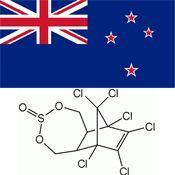
New Zealand’s Environmental Risk Management Authority (ERMA) on Monday banned the importation, manufacture and use of the toxic pesticide endosulfan, which has pleased the country’s environmental groups but left some growers worried about the lack of alternatives.
Endosulfan has already been banned in 55 other countries due to its toxic nature and long residual life. The chemical is acutely toxic to humans and marine animals, according to the Nelson Mail.
The ERMA ban will take effect from 16 January – not what the industry had hoped for, according to Horticulture New Zealand’s CEO Peter Silcock, who says a longer timeframe was asked for.
“We asked for a phase-out period of five years so a handful of industries could find sensible alternative products to use,” he said. “In a couple of cases, there are no alternatives. Citrus and tomato growers are going to be under huge pressure.”
Endosulfan is use in particular to treat the Australian citrus whitefly pest. Northland citrus grower Rick Curtin told the Nelson Mail the ban would mean reduced yields and quality.
“It’s not too strong to say that for some growers, it could make things uneconomical,” he stated.
The largest citrus grower in New Zealand’s South Island, however, supported the ban. Mike Curnow in Motueka said endosulfan was not a chemical consumers wanted to be exposed to.
“I support the ban because endosulfan is a pretty fearsome contaminant,” he said. “It goes a long way and has residual problems. I don’t think local consumers need to have sprays which are banned overseas.”
New Zealand’s Green Party was pleased with the ERMA’s decision, but was concerned how the remaining endosulfan stocks would be disposed of. About 26,000l of the chemical are still stored in the country.



